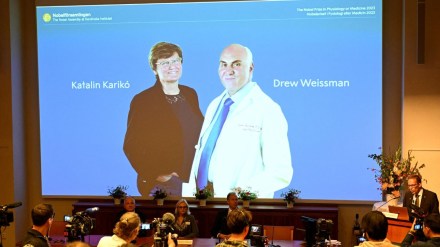Dr. Katalin Kariko and Dr. Drew Weissman, the visionary scientists behind the pioneering technology enabling mRNA-based Covid vaccines, have been honored with the Nobel Prize in Physiology or Medicine. This groundbreaking technology, initially experimental in nature, has since been administered to countless individuals worldwide. Beyond its remarkable success in combating the pandemic, this mRNA technology is currently under investigation for potential applications in addressing various other diseases, including cancer.
Vaccines instruct the immune system to identify and combat viruses and bacteria, but their methods have evolved.
Traditional vaccines employed weakened or deceased virus/bacteria forms or fragments. In contrast, mRNA vaccines, like Moderna and Pfizer/BioNTech during the Covid pandemic, adopted a distinct approach.
The Nobel Prize also posted on X, formerly Twitter, about Dr. Katalin Kariko and Dr. Drew Weissman being awarded the Nobel Prize in Physiology or Medicine.
Kariko served as the senior vice president and head of RNA protein replacement at BioNTech until 2022. Since then, she has been an adviser to the company. Additionally, she holds a professorship at the University of Szeged in Hungary and serves as an adjunct professor at the University of Pennsylvania’s Perelman School of Medicine.
Weissman holds a position as a professor specializing in vaccine research at the Perelman School.
Kariko made a significant breakthrough by devising a method to prevent the immune system from triggering an inflammatory response against artificially created mRNA, which had been a major obstacle to the therapeutic use of mRNA. Collaborating with Weissman in 2005, they demonstrated that modifications to nucleosides, the building blocks of mRNA’s genetic code, could help conceal the mRNA from the immune system’s detection.
RNA technology acts as a translator within the human body, transforming DNA’s genetic instructions into functional proteins.
The concept underlying mRNA vaccines involves infiltrating this process. By designing mRNA that generates segments of a virus or other pathogen, the body manufactures these foreign proteins, teaching the immune system to combat them.
Initially, there were challenges in the development stages. However, through refinements in the technology, researchers achieved the production of significant quantities of the desired protein without triggering dangerous levels of inflammation observed in animal trials. This breakthrough paved the way for advancing vaccine technology in human trials.
During the Covid-19 pandemic, mRNA vaccines were engineered to produce the “spike protein” characteristic of the virus.
